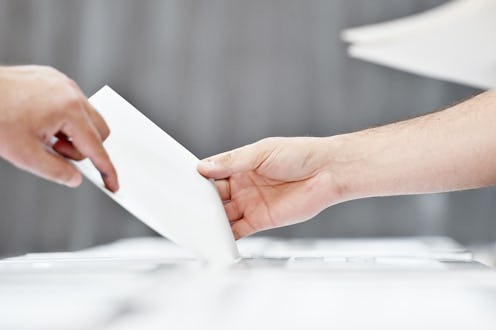News
What Is An Elector?

This year, the 2016 presidential election will be officially decided, not by the voters themselves, but by the Electoral College, a group of 538 electors who vote for the president and vice president after the popular vote is cast. But what is an elector anyway? Read on to find out more about the people who will actually decide the election in 2016.
When you vote on Election Day, you'll be voting not for Donald Trump or Hillary Clinton (or Gary Johnson, or Jill Stein, etc), but for a group of electors in your state, who will, in turn, cast their votes on the first Monday after the second Wednesday in December (this year's voting date is Dec. 19). Depending on your state's voting process, you may or may not see the names of electors listed with the president and VP candidates on the ballot. But who are these people?
The Constitution lists only a few requirements for electors: They cannot be members of the U.S. Congress, they can't "[hold] an Office of Trust or Profit under the United States," and they cannot have "engaged in insurrection or rebellion" against the United States. Beyond those rules, each state has the right to appoint electors as it sees fit.
Usually, electors are either selected by political parties, or they campaign for the appointment and the state party votes on it. In most cases, electors are people who are already involved in their party or politics more generally. According to HowStuffWorks, that can include "political activists, party leaders, elected officials of the state and even people who have personal or political ties to the presidential candidates."
Every state gets a number of electors equivalent to the number of seats the state has in Congress — so that means every state automatically has two electors (for its two senators), plus the number of members it has in the House of Representatives. A state's number of representatives depends on its population, so a state's population also has a huge effect on its number of Electoral College votes. California has the most votes of any state with 55, followed by Texas (38 votes), and New York and Florida (both have 29 votes). Alaska, Delaware, Montana, North Dakota, South Dakota, Vermont, and Wyoming all have the fewest, with three votes each; the District of Columbia also has three.
Most states practice an "all or nothing" policy with electoral votes, meaning that whichever candidate gets the most popular votes gets all of the state's electoral votes. (So, for example, if Candidate A won one more vote in California than Candidate B, Candidate A would still get all 55 of California's Electoral College votes. That's why it's possible for a candidate to lose the popular vote and still win the election, as George W. Bush did in 2000.) Maine and Nebraska are the outliers — they have systems that allow electoral votes to be split between candidates.
So how do you know that the electors you vote for will actually vote for the candidate selected by the popular vote? In some states, you don't. The National Archives and Records Administration (NARA) reports that neither the U.S. Constitution nor federal law require that electors stay in line with the popular vote. However, two dozen states have laws on the books to punish electors who don't vote for the candidate they've committed to; they are known as "faithless electors." The likelihood of faithless electors is low in any case, because electors are usually people who are already affiliated with a political party (so, for example, if Clinton wins a state's popular vote, that vote will elect a group of electors selected by the state's Democratic Party, who are unlikely to vote for another party's candidate). There have been a few cases here and there of faithless electors, but, so far at least, they've never affected the outcome of an election.
The Electoral College system can seem unnecessarily complex at times, but rest assured that your vote does count. You may not technically be voting directly for your candidate of choice, but you'll be selecting the people who will make the official vote.